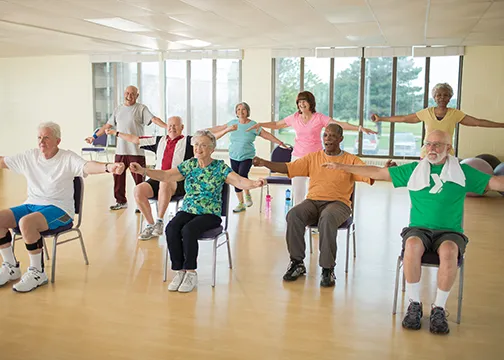It’s easy to forget that a healthy lifestyle is really a life-long goal. Eating right and exercising are habits that should carry on and adjust with age, so we maintain good health throughout our lifetime. But as we move to 50, 60 and beyond, what constitutes a healthy lifestyle may look just a little different. Here are some suggestions for helping seniors stay happy, fit and active.
Keep Moving: Exercise provides many benefits for seniors including maintaining strong bones, keeping blood pressure and blood sugar in check and reducing stress. Consult your doctor about exercising and then discuss with him/her how to exercise with activities you’d enjoy such as walking, biking, martial arts, swimming or a low-impact exercise class designed for older adults.
Eat Those Greens: Eating a well-balanced diet rich with fruits and vegetables, good proteins such as fish and poultry and unsaturated fats including olive oil and avocado has been shown to help ward off dementia and keep the brain healthy. Make sure to first consult your doctor to find the best diet for your needs.
Make It Social: While staying socially engaged can be fun, for seniors, it’s been shown to decrease risks for cardiovascular disease, reduce chances for Alzheimer’s and other forms of dementia and lower the possibility of depression. To stay socially active, look at joining a senior community center, take a class, go to church or start a bridge or book club.
Balance It Out: Falls can sideline anyone, but especially an older adult whose bones may be more fragile. Simple fixes to help maintain balance and prevent injuries from falls include shower/bath supports, good-fitting shoes, a decluttered house and drinking enough water. Exercise is also important in fall prevention, as it strengthens bones and improves coordination, so make sure to find time to work out.
Keep Those Appointments: Regular check-ups are essential for seniors. Your doctor will likely want to check in on medications, see how your blood work looks, and ensure that you aren’t feeling anxious or depressed. So keep those regular appointments with your doctor or specialist and let him/her know about any new symptoms or concerns you have.
Stay Involved: Older adults often live alone and may feel isolated, or worse, depressed. Getting involved in activities where seniors feel valued and can share their experience and expertise with others may be the best medicine. Volunteering or working a part-time job can keep mental faculties sharp and help keep loneliness and depression at bay.
Bring your favorite older adults to your local YMCA of the Suncoast to find programs that will help them stay healthy and happy.
Keep Moving: Exercise provides many benefits for seniors including maintaining strong bones, keeping blood pressure and blood sugar in check and reducing stress. Consult your doctor about exercising and then discuss with him/her how to exercise with activities you’d enjoy such as walking, biking, martial arts, swimming or a low-impact exercise class designed for older adults.
Eat Those Greens: Eating a well-balanced diet rich with fruits and vegetables, good proteins such as fish and poultry and unsaturated fats including olive oil and avocado has been shown to help ward off dementia and keep the brain healthy. Make sure to first consult your doctor to find the best diet for your needs.
Make It Social: While staying socially engaged can be fun, for seniors, it’s been shown to decrease risks for cardiovascular disease, reduce chances for Alzheimer’s and other forms of dementia and lower the possibility of depression. To stay socially active, look at joining a senior community center, take a class, go to church or start a bridge or book club.
Balance It Out: Falls can sideline anyone, but especially an older adult whose bones may be more fragile. Simple fixes to help maintain balance and prevent injuries from falls include shower/bath supports, good-fitting shoes, a decluttered house and drinking enough water. Exercise is also important in fall prevention, as it strengthens bones and improves coordination, so make sure to find time to work out.
Keep Those Appointments: Regular check-ups are essential for seniors. Your doctor will likely want to check in on medications, see how your blood work looks, and ensure that you aren’t feeling anxious or depressed. So keep those regular appointments with your doctor or specialist and let him/her know about any new symptoms or concerns you have.
Stay Involved: Older adults often live alone and may feel isolated, or worse, depressed. Getting involved in activities where seniors feel valued and can share their experience and expertise with others may be the best medicine. Volunteering or working a part-time job can keep mental faculties sharp and help keep loneliness and depression at bay.
Bring your favorite older adults to your local YMCA of the Suncoast to find programs that will help them stay healthy and happy.
